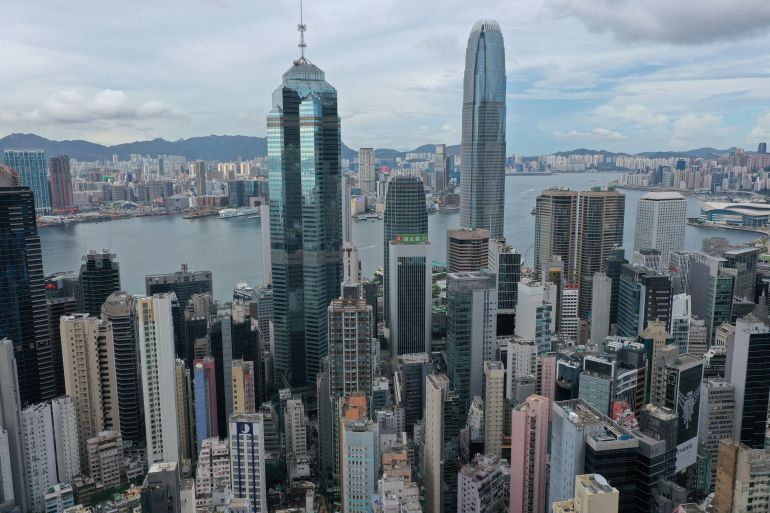Hong Kong unveils $22bn budget as ‘zero COVID’ hammers businesses
Finance chief admits businesses facing ‘intense pressure’ amid restrictions that have shut down much of the economy.

Hong Kong, China – Hong Kong announced a HK$170 billion ($21.79bn) budget to boost its flailing economy on Wednesday, as the territory battles a fifth wave of coronavirus infections with its harshest pandemic restrictions yet.
The budget is aimed at offsetting the shock of Hong Kong’s continuing strict pandemic restrictions on households and businesses, and mitigating long-term damage to the economy.
Keep reading
list of 4 itemsRussian billionaires see wealth tumble as tensions escalate
Israel fires missiles on border positions inside Syria
‘Shared resentments’ but Russia ties could be ‘awkward’ for China
Financial Secretary Paul Chan described a recent surge in cases of the Omicron coronavirus variant as dealing a “heavy blow” to residents and small enterprises, and said retail businesses in particular would face “intense pressure” in the short term.
The new relief measures include a handout of $10,000 Hong Kong dollars ($1,282) in consumption vouchers for 6.6 million residents, as well as loans, tax breaks and subsidies for struggling businesses. Property rate concessions, rental relief and electricity subsidies are also on offer.
Chan’s budget comes a day after Hong Kong authorities announced that tough social-distancing rules on gathering and dining will be extended until at least April. Under the measures, all bars, gyms and beauty parlours in the city have been forced to close, while restaurants are only allowed to offer dine-in services before 6pm. While other parts of the world are dropping restrictions, the international financial centre is imposing its harshest measures yet under a controversial “dynamic zero-COVID” policy designed to align with mainland China.
Gary Ng, an economist at Natixis, said the government had decided to give residents and businesses a cash injection because of the economic toll inflicted by its zero-tolerance pandemic strategy.
“One of the key concerns in Hong Kong right now is that, even if you have the vouchers, where are you going to spend it?” Ng told Al Jazeera. “Everything is closed, business hours are reduced, especially in the services sector, there’s a really big problem.”
Ng said the government had so far used “sticks” to contain the virus through restrictions on business hours and socialising, but the new budget finally offered some “carrots”.
“There is no reason for them not to offer incentives to compensate businesses, especially with a fiscal surplus last year,” said Ng.
Pressure from business community
Chan said he was confident the economy would rebound in the second half of the year, estimating an expansion of 2 to 3.5 percent for the entire year. Hong Kong’s economy grew 6.4 percent in 2021.
Ng described the government forecast as “optimistic”, arguing it would be “hard to achieve that higher range, given the circumstances right now”.
“The government forecast is probably based on the assumption that COVID zero can be reached in the next few months, but the problem is how long it can last and what cost is needed to maintain it?”
Despite growing pressure from the business community to shift towards a mitigation strategy, the Hong Kong government has given no sign it is willing to veer from the path taken by mainland China.
During his budget speech, Chan reiterated the Hong Kong government’s commitment to its so-called “dynamic zero COVID” policy.
“A stabilised epidemic situation will also create favourable conditions for the gradual and orderly resumption of quarantine-free travel between the mainland and Hong Kong, thereby injecting greater impetus into the economy,” Chan said.
Heiwai Tang, a professor of economics at the University of Hong Kong, called the budget “progressive”, saying it should be “effective in terms of reducing some of the pain felt by us in Hong Kong”.
However, Tang warned that the government’s strict COVID policies could see the city suffer long-term economic and reputational damage. He said doubling down on its strategy could trigger an exodus of talent and jeopardise Hong Kong’s role as a financial hub.
“My concern is the uncertainty. What next?” Tang told Al Jazeera.
“A lot of expats are planning to leave and they will not come back. Even the mainland China elites in my circle, many of them managing directors, are considering leaving as well. This is not going to be reflected in this year’s GDP numbers but it will affect the overall competitiveness of this city, if the current wave continues to linger with highly uncertain policies.”
Other measures announced by Chan in Wednesday’s budget include a $HK1.26 billion ($161.5m) boost for the tourism sector, which has been battered by some of the toughest border policies in the world.